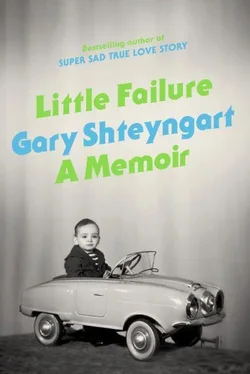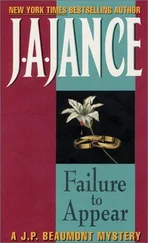No caption needed.
MY FIRST YEAR AT STUYVESANT I discover something new about me, something my family never suspected.
I am a terrible student.
In grade school, my father taught me from advanced Soviet textbooks. I would try to solve the math problems in the back of the composition books in which I wrote The Chalenge, Invasion from Outer Space , and my other sci-fi novellas. The algebraic scrawl looks impressive enough for a third grader, but above the math problems I have written for my father to see: YA NICHEVO [ sic ] NEZNAYU , I don’t know anything. On another page, in English, “All wrong.”
Schoolwork has always come easy for me. In Hebrew school, my competition was Best Friend Jonathan, David the Mighty Khan Caesar, and maybe three girls. At Stuyvesant there are two thousand and eight hundred children far more gifted than I am, half of them hailing from points east of Leningrad. In class they are bent over their desks like so many human architect lamps, humming softly, insanely, to themselves the way Glenn Gould would hum over his piano, little pockets of drool shining on their chins, the corners of their eyes covered with the only sleep they’ll ever know, their pencils assuredly making magic against their notebooks as equations are swiftly put to bed. What accounts for their commitment? Who is tending their home fires? What awaits them if they fail? I always thought Papa beat me too much, but what if he didn’t beat me enough?
I am scared. At Hebrew school, I thought I would outgrow my subhumanity by sheer force of will, by clawing my way into the Ivy League and then into the graces of the upper class. I would out-Jaguar my classmates with my sechel , my thick Jewish brain. That was my way out. By the end of the first two weeks of Stuyvesant I conclude that this path will be closed to me forever. At Stuyvesant, that’s how quickly you know whether or not you will succeed in life.
The teacher — an African American woman in a bright designer blouse, an impeccably coiffed bun at the back of her neck — questioningly clicks her brilliant chalk against the board as the immigrant students call out the right and proper answers. She calls, they respond. Except for one student in his Ocean Pacific T-shirt covered with waves of flop sweat under the armpits who is staring blankly at the board as the new language of Sine, Cosine, Tangent is called out around him, as students who got the answer only partially right smack themselves violently across the forehead. “Nice going,” one of them keeps saying to himself, sarcastically. “Nice going.”
Won’t someone please take me back to Hebrew school? I’ll do anything, I’ll believe anything! I’ll memorize the Passover Haggadah. I’ll chant all the gibberish at the top of my lungs. Baruch atah Adonai, Eloheinu melech ha parabola . Just get me out of here. Just let me be a good student again, so at least my parents will have that .
In biology class, I am paired with a Vietnamese girl of some ninety pounds, most of them brain matter, who swiftly dismembers a frog and labels all of its organs in English and Latin. “Aren’t you going to do anything ?” she says as I stand there with my scalpel as impotent as it is erect. “Are you, like, retarded?”
I was once the Red Gerbil; I was once Gary Gnu. You could spit at me or bean me with your spit-covered Carvel ice-cream stick or not invite me to your Great Neck roller rink Bat Mitzvah. But you could never say I was stupid. And now I am. Stupid enough to almost fail out of Spanish class. Stupid enough to stare at a page of geometry for half a day and come away with nothing but the conclusion that triangles have three sides. And if I could understand what a negative feedback loop is in biology class, I could maybe understand that the more I feel stupid, the stupider I become. The anxiety grows and reinforces itself. The tests — and they are daily — grow more difficult, not less. And with each week, with each test, I am getting closer to it .
It is the report card. It tells you what your station in life will be. Because the immigrant children of Stuyvesant do not have backup plans. We will not be filling in at our daddy’s firm or taking a gap year in Laos. Some of us are from Laos.
The report card, printed on flimsy dot-matrix toilet paper, is handed out in morning homeroom, our eyes instantly skirting past the individual grades to the bottom number, the average.
I am crying even before I see the four digits.
82.33.
Essentially, a B.
Harvard, Yale, Princeton?
Lehigh, Lafayette, maybe Bucknell.
What does it mean for an immigrant child of the top rank to go to Bucknell University?
It means I have failed my parents. I have failed myself. I have failed my future. We may as well have never come here.

Stuvyesant in 1987 resembles a Lower East Side tenement at the turn of the last century: The school’s snot-colored passages are filled to bursting; central hallways form their own crowded Broadways; smaller hallways are the equivalent of major crosstown streets. The first-year students latch on to others who look like them; they travel in packs. Here is Tiny Taiwan, Mini Macao, Petite Port-au-Prince, and Lesser Leningrad. Despite my first-day success playing Ultimate Frisbee with some future jocks, I am still much too shy and unsure of myself to fully make friends, and I spend half my lunch breaks hiding out in the bathroom, where a triad of Chinese “toughs” smoke at one another.
On Tuesdays and Thursdays, a Filipino-or-maybe-Mexican kid accompanies me to a sandwich shop called Blimpie, where I buy a breaded chicken sandwich that is too big, but that I eat anyway because it costs 499 cents. My parents give me six dollars a day for food, which makes me comparatively rich, but the guilt of eating an expensive breaded chicken while getting a Lehigh average is too much to bear.
“Yo.”
“ ’Sup.”
“What’s your average?”
“82.33.”
“Shit.”
“I know.”
“What are you thinking?”
“Lehigh.”
“Fuck.”
“Maybe Bucknell.”
“You might as well go to SUNY-Albany, save some money, do really well, and then transfer someplace better.”
“Haverford accepted an Albany transfer with just a 3.78 in 1984.”
“Dude, that was 1983. Their selectivity ranking’s gone up since then.”
“I thought they dropped to ninth place on U.S. News & World Report .”
“Medicine or law after?”
“Law.”
“Hastings in California. They’re a sleeper school, but they take a lot of SUNY kids.”
“I just got the latest Essays That Worked for Law School .”
“My mother just left one under my pillow with Duke, like, highlighted three times.”
Just two fifteen-year-old kids with ghastly new mustaches talking, one a relatively spoiled son of a Russian engineer, the other trying to work his way out of his parents’ grocery store.
Just two boys shooting the shit.

The weather has turned cold. My first Manhattan winter. Snowdrifts form around Beth Israel’s psychiatric ward, where, soon enough, two of my classmates will find a home, one after retiring to Central Park to build his own igloo in the middle of the frozen night. On the 1.5-floor landing of our new Little Neck colonial, I stare out the window as the snow makes pretty the future site of my father’s productive raspberry patch. (Between my father’s weekly fishing and his growing fruits and vegetables, we will soon be entirely self-sustaining!) The next house over is already in Great Neck. Little Neck is middle class; Great Neck is rich . That next house over had been the plan for me. Until now.
Читать дальше













